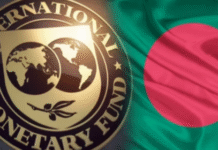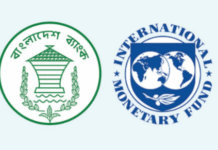Act promptly to fix banking ills: IMF
Siddique Islam |Financial Express October 19, 2019

The International Monetary Fund (IMF) has put forwarded a six-point recipe for Bangladesh to address its banking sector weaknesses.
The recommendations include strong corporate governance, enforcing ‘fit and proper criteria’ for banks’ directors, enhancing banking regulations, reforming state banks, tightening criteria for loan rescheduling or restructuring and enhanced legal system to accelerate loan recovery.
Daisaku Kihara, South Asia division chief at the Fund’s Asia and Pacific department, identified the areas.
“Prompt actions are required to address the weakness in the banking sector,” Mr Kihara said in an emailed interview.
The situation in the banking sector continues to deteriorate despite strong economic growth of Bangladesh, according to the IMF official.
In particular, total stressed advances, which include non-performing loans (NPLs), restructured and rescheduled credit, now exceed 20 per cent of total lending, he added.
Mr Kihara also said the high level of stressed assets limits the banks’ ability to engage in new lending and limits access to credit.
“Weak governance in the banking sector is one of the contributing factors behind these developments and has led sometimes to serious graft cases,” the IMF official noted.
He also laid emphasis on developing a well-functioning capital market to reduce the economy’s dependence on bank financing.
In this context, the ongoing reform of the national savings certificates should continue with changes in the pricing mechanism in future, he argued.
“Bangladesh continues to achieve impressive economic growth and social development. It made steady progress in reducing poverty and improving many Sustainable Development Goals indicators,” the IMF official said while narrating the overall macroeconomic outlook for the Bangladesh economy.
He also said economic growth is projected to be strong at above mid-7.0 per cent in both fiscal year 2018-19 and FY ’20, led by private consumption with strong remittance inflows and sustained export growth.
Average annual inflation is expected at close to the central bank’s 5.50 per cent target, though non-food inflation slightly picked up over the last few months.
However, risks to the outlook are tilted downward with slow progress in banking sector reforms, potentially weaker-than expected global growth, and rising protectionism, Mr Kihara noted.
He also said Bangladesh has significant growth potential with favorable demographics to make progress towards the authorities’ ambition to reach the higher middle-income status.
In the near-term, prudent macroeconomic policy management should continue to promote growth, while preserving the fiscal sustainability and financial stability.
The IMF senior executive lauded the government’s “strong commitment” to keeping fiscal deficits within 5.0 per cent of GDP (gross domestic product).
Still, the FY ’20 budget continues to have an ambitious revenue target, according to Mr Kihara.
“While the likely revenue shortfall will be compensated by lower spending, it will be important to protect priority social spending,” the IMF official said.
He also said the government needs to address key bottlenecks to promote investments, including a weak banking sector, insufficient infrastructure and governance weaknesses.
“The possible global slowdown is one of the key downside risks for Bangladesh’s economy,” the IMF official said while replying to a question about the potential adverse impacts on Bangladesh economy in the aftermath of global economic slowdown.
“Furthermore, demand shifts toward Bangladesh from trade disputes could partially mitigate the negative impacts from the potential global economic slowdown,” Mr Kihara noted.
Indeed, export growth in FY ’19 has been robust at more than 10 per cent and this trend is expected to continue in FY ’20.
Regarding monetary policy, the IMF official said the central bank should monitor inflation developments closely and stand ready to adjust its policy promptly.
The IMF senior executive also talked about the possible impact on new VAT law, saying its implementation from FY ’20 is a step towards modernising the tax regime.
However, with multiple rates, a significant increase in the VAT threshold and implementation challenges, it is uncertain whether the implementation will have positive revenue impact, particularly in the near term, Mr Kihara warned.
“We encourage the authorities to continue to work towards a simpler VAT structure with fewer non-standard rates and exemptions and a well-functioning refund mechanism,” he said.
About enhancing tax-GDP ratio of Bangladesh, the IMF official said raising tax revenue is indispensable for improving public infrastructure and sustain strong growth.
Bangladesh is lagging behind its peers in the collection of personal income tax and consumption tax, he said, adding that increasing tax revenues would require a coordinated approach in both tax administration and tax policy areas.
For tax administration, the priority is modernising the organisational structure of the National Board of Revenue to improve its efficiency and the coordination of its different wings.
“Tax policy should focus on tax base broadening and reducing tax concessions and tax avoidance,” the IMF official suggested.
siddique.islam@gmail.com









